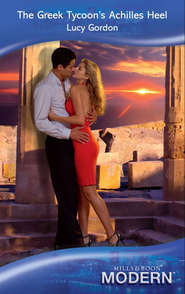По всем вопросам обращайтесь на: info@litportal.ru
(©) 2003-2024.
✖
The Italian's Baby
Автор
Год написания книги
2018
Настройки чтения
Размер шрифта
Высота строк
Поля
‘You think I’m going to allow that? You think my daughter is going to marry that low-life? The sooner this is fixed the better.’
‘I’m going to have my baby.’
‘The hell you are!’
She ran away that night. Frank followed her to Luca’s house and tried to buy her back. But the mention of money only made Luca roar with laughter. Later Becky was to realise what her father heard in that laughter. It was the roar of the young lion telling the old lion that he no longer ruled. Perhaps her father’s real hatred dated from that moment.
He tried to enlist the help of the locals, but he was thwarted. Frank Solway was powerful but Luca was one of them, and nobody was ready to raise their hand against him.
But Becky knew he wouldn’t give up, and in the end it was she who suggested they leave.
‘Just for a while, darling. Dad’ll feel better about it when he’s a grandfather.’
He sighed. ‘I hate running away, but all this quarrelling is bad for you and the baby. We’ll go for the sake of some peace.’
They fled south to stay with his friends in Naples. After two weeks he bought an old car, repaired it himself, and they set off again, heading south to Calabria. Two weeks there, then north again.
They talked about marriage but never stayed anywhere long enough to complete the formalities, just in case Frank’s tentacles reached them. Wherever they went his skilled hands found him work. It was a good life.
Becky had not known that such happiness was possible. She was over the first sickness of pregnancy, feeling well and strong, spending her life with the man she adored. Their love was the unquestioning, uncomplicated kind that inspired songs and stories, with a happy-ever-after always promised at the end. She loved him, he loved her, and their baby would arrive soon. What more was there?
The thought of Frank was always there in the background, but as week followed week with no sign of him he faded and became unreal, a ‘maybe’ rather than a genuine threat.
She began to understand Luca better, and herself. It was Luca who revealed her body to her, its fierce responses, its eagerness for physical love. But it was also through him, and the life they lived, that she was able to stand outside herself, and look with critical eyes. What she saw did not please her.
‘I was horrid,’ she said to him once. ‘A real spoilt brat, taking everything for granted, letting Dad indulge me and never wondering where the money came from. But it actually came from men like the ones who stopped me that day. He practically stole from them. You can’t really blame them, can you?’
‘You can’t blame yourself, either,’ he insisted. ‘You were so young, how could it occur to you to ask questions about your father’s methods? But when your eyes were opened you didn’t try to look away. My Becky is too brave for that.’
There was always a special note in his voice when he said ‘my Becky’, as though all the best in her was a personal gift to himself, to be treasured. It made her feel like the most important person in the world. And in the world they made together, that was true.
She gradually came to understand that Luca was one person to her, and a different man to everyone else. The attackers who had fled him, filled with fear, had seen the side of him that others saw.
He was a potentially frightening man who carried with him an aura of being always on the edge of ruthlessness, even violence. It took time for Becky to understand this, because he never showed that side of himself to her.
They had their arguments, even outright rows, but he fought fair, never turning his ferocity on her, and always bringing the spat to a speedy end, often by simply giving in. It hurt him to be at odds with her.
In their daily life he was tender, loving and gentle, setting her on a pedestal and asserting, by his actions, that she was different from all other human beings on earth.
His love for her carried a hint of worship that awed and delighted her, even while it sometimes made him over-protective to the point of being dictatorial. It was he who decided, in her sixth month, that their lovemaking must cease until after the baby was born, and she had fully recovered.
Torn by desire, she wept and pleaded. ‘It’s too soon. The doctor says we’ve time yet.’
‘The doctor is not the father of your baby. I am, and I have decided that it is time to stop,’ he declared in the most arrogant statement she had yet heard from him.
‘But what will you do? It’s months and months, and you’ll—well, you know.’
‘What are you saying? That you don’t trust me to be faithful to you?’
‘Well, I don’t know, do I?’ she cried.
There was a flash of temper on his face, for he had never given her a moment’s cause for anxiety. But anger was gone in a instant, dissolved in laughter.
‘Oh, stop that,’ she said, thumping him in frustration.
But he roared aloud with laughter, holding her carefully against him.
‘Amor mia, I promise to be home at the proper time every evening, and you may put a collar and lead about my neck,’ he said with a grin.
‘And every man in the place will say you’re living under my thumb, and laugh at you.’
‘But I don’t care what they think, only what you think,’ he said, serious again. ‘You and our child are everything in life to me.’
He stuck to his resolve, keeping an iron control over himself, and spending all his spare time at home. Becky, talking to other expectant mothers in doctors’ waiting rooms, knew just how lucky she was.
For most of the time she could push serious matters aside to enjoy their life. Everything was fun. Being poor, learning how to shop so that she got the best out of his wages, living in old jeans and letting them out as she put on weight—all this was fun.
It was Luca who finally decided that they should settle in one spot. She was now more than six months gone, and he said, ‘I want you under the care of the same doctor from now on.’
They had reached Carenna, a small town near Florence, where he had found work with a local builder. It was a pleasant place to put down roots. He located a good doctor, found some birth classes, and attended them with her, mastering all the exercises, to her tender amusement. At home they practised together until they collapsed with laughter.
Perhaps so much happiness could never last. Sometimes it seemed as though she’d used up her life-time’s allowance in those few glorious months.
Philip Steyne’s house was on the edge of London. As befitted his money, it was a mansion, set in its own grounds, with far more rooms than he needed.
The dinner party was for twenty, a number just large enough to allow a mix, but small enough for the right people to home in on each other.
Rebecca knew what was expected of her and dressed accordingly in a dress of wine-red velvet that hugged her slender figure. Black silk stockings sheathed her legs, finishing in dainty black sandals. Tonight she let her long blonde hair flow freely in a ‘natural’ style that had taken the beauty parlour three hours to perfect, and which set the seal on her glamour. Her solid gold necklace and earrings were Danvers’ gift ‘to mark the occasion’.
‘We still don’t know who’s actually coming tonight,’ he remarked as the car purred into the drive. ‘Raditore has played coy as to whether it’ll be the chairman, chief executive or managing director.’
‘Does it matter?’ she asked. ‘I know my job, and I it’ll be much the same whoever it is.’
‘That’s right. Just make his head spin. I must say, you’re dressed for it. I’ve never seen you looking so good.’
‘Thank you.’
‘I’m always proud of you.’
‘Thank you,’ she said again, speaking mechanically. It was hard to respond in any way, since Danvers paid compliments as though ticking off a list.
The car glided silently through the gate, down the long drive to the house. When they were nearly there Rebecca had a moment of strange and disturbing consciousness.
Suddenly the luxurious car was every luxurious car she had ever journeyed in, the huge, moneyed house was the end of a long line of moneyed houses, the dinner party to meet rich men, and charm them, was indistinguishable from so many—too many—others.
There was the house, the front door being pulled open, her hosts coming out onto the step, welcoming smiles in place. Philip Steyne’s suit had been tailored in Savile Row, his wife’s dress was haute couture. Like so many others.
‘Danvers, Rebecca, how lovely to see you. Come in, come—Rebecca, you look lovely as always—what a lovely dress…’











